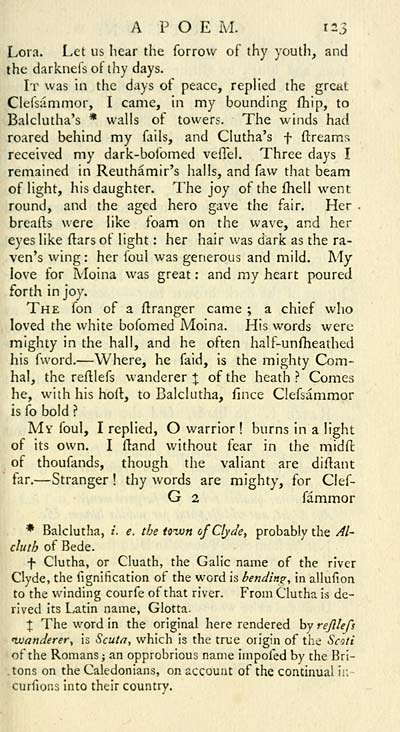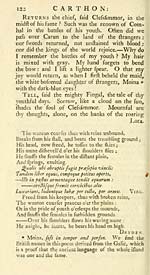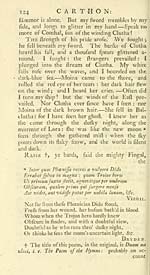Ossian Collection > Fingal
(163)
Download files
Complete book:
Individual page:
Thumbnail gallery: Grid view | List view

A P O E M. 123
Loia. Let us hear the forrow of thy youth, and
the darkneisof thy days.
It was HI the days of peace, replied the great
Clefsammor, I came, in my bounding fhip, to
Balclutha's * walls of towers. The winds had
roared behind my fails, and Clutha's f dreams
received my dark-bofomed veflel. Three days I
remained in Reuthamir's halls, and faw that beam
of light, his daughter. The joy ofthefhell went
round, and the aged hero gave the fair. Her .
breads were like foam on the wave, and her
eyes like ftars of light : her hair was dark as the ra-
ven's wing: her foul was generous and mild. My
love for Molna was great ; and ray heart poured
forth in joy.
The fon of a Granger came ; a chief who
loved the white bofomed Molna, His words were
mighty in the hall, and he often half-unfheathed
his fword. — Where, he faid, is the mighty Com-
hal, the reftlefs wanderer % of the heath ? Comes
he, with his hod, to Balclutha, fince Clefsammor
is fo bold ?
My foul, I replied, O warrior ! burns in a light
of its own. I ftand without fear in the midffc
of thoufands, though the valiant are difiiant
far. — Stranger ! thy words are mighty, for Clef-
G 2 fammor
* Balclutha, i. e. the toivn ofClj^e, probably the ^l-
cluth of Bade.
f Clutha, or Cluath, the Galic name of the river
Clyde, the fignihcation of the word is bending, in allufion
to the winding courfe of that river. From Clutha is de-
rived its Latin name, Glotta.
X The word in the original here rendered by rejllefs
njoanderer, is Scuta, which is the true origin of the Scoti
of the Romans; an opprobrious name impofed by the Brl-
.tons on the Caledonians, on account of the continual ii;
curfions into their country.
Loia. Let us hear the forrow of thy youth, and
the darkneisof thy days.
It was HI the days of peace, replied the great
Clefsammor, I came, in my bounding fhip, to
Balclutha's * walls of towers. The winds had
roared behind my fails, and Clutha's f dreams
received my dark-bofomed veflel. Three days I
remained in Reuthamir's halls, and faw that beam
of light, his daughter. The joy ofthefhell went
round, and the aged hero gave the fair. Her .
breads were like foam on the wave, and her
eyes like ftars of light : her hair was dark as the ra-
ven's wing: her foul was generous and mild. My
love for Molna was great ; and ray heart poured
forth in joy.
The fon of a Granger came ; a chief who
loved the white bofomed Molna, His words were
mighty in the hall, and he often half-unfheathed
his fword. — Where, he faid, is the mighty Com-
hal, the reftlefs wanderer % of the heath ? Comes
he, with his hod, to Balclutha, fince Clefsammor
is fo bold ?
My foul, I replied, O warrior ! burns in a light
of its own. I ftand without fear in the midffc
of thoufands, though the valiant are difiiant
far. — Stranger ! thy words are mighty, for Clef-
G 2 fammor
* Balclutha, i. e. the toivn ofClj^e, probably the ^l-
cluth of Bade.
f Clutha, or Cluath, the Galic name of the river
Clyde, the fignihcation of the word is bending, in allufion
to the winding courfe of that river. From Clutha is de-
rived its Latin name, Glotta.
X The word in the original here rendered by rejllefs
njoanderer, is Scuta, which is the true origin of the Scoti
of the Romans; an opprobrious name impofed by the Brl-
.tons on the Caledonians, on account of the continual ii;
curfions into their country.
Set display mode to: Large image | Transcription
Images and transcriptions on this page, including medium image downloads, may be used under the Creative Commons Attribution 4.0 International Licence unless otherwise stated. ![]()
| Early Gaelic Book Collections > Ossian Collection > Fingal > (163) |
|---|
| Permanent URL | https://digital.nls.uk/79175607 |
|---|
| Description | Selected books from the Ossian Collection of 327 volumes, originally assembled by J. Norman Methven of Perth. Different editions and translations of James MacPherson's epic poem 'Ossian', some with a map of the 'Kingdom of Connor'. Also secondary material relating to Ossianic poetry and the Ossian controversy. |
|---|
| Description | Selected items from five 'Special and Named Printed Collections'. Includes books in Gaelic and other Celtic languages, works about the Gaels, their languages, literature, culture and history. |
|---|

